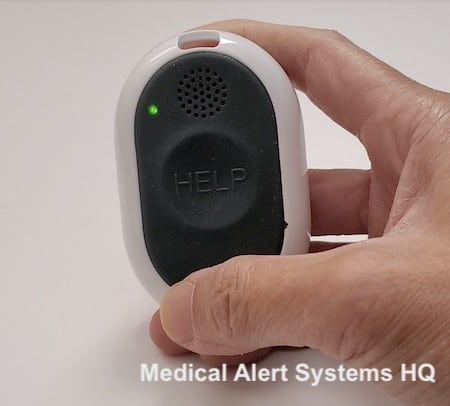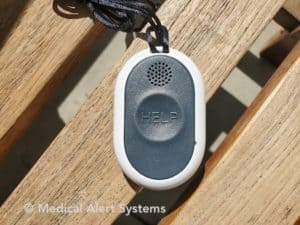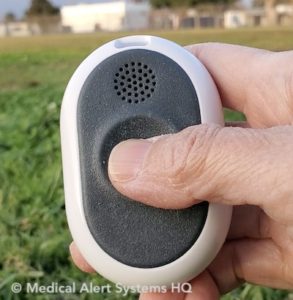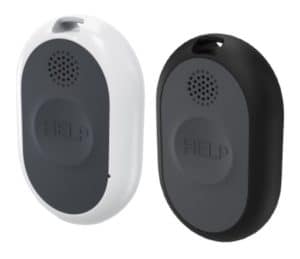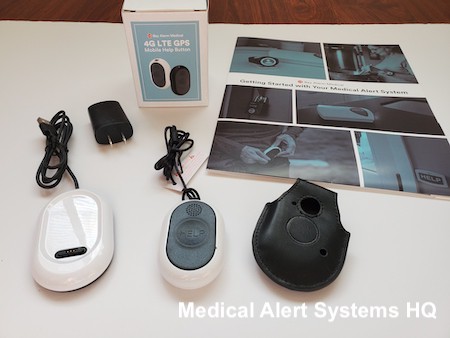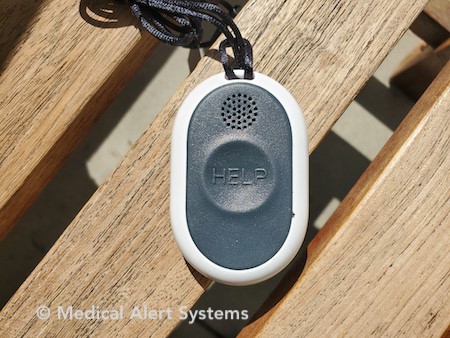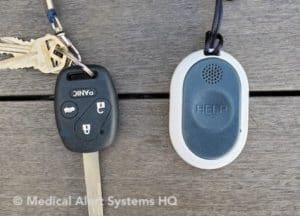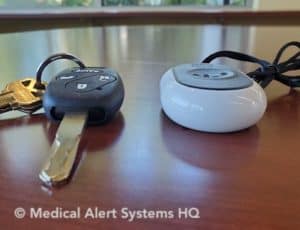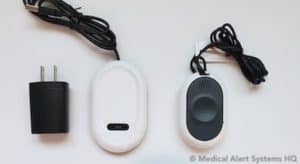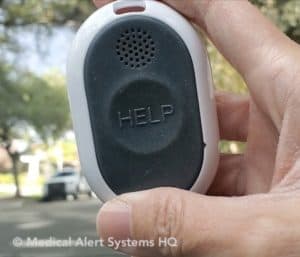Last Updated on November 4, 2022
Questions? Call toll-free 1-855-397-9964 or visit Bay Alarm Medical’s website
The Bay Alarm Medical GPS on-the-go device is a portable mobile alert device that will allow users to connect to 24/7 monitoring help both at home and out of the home. It is suited for seniors leading active lifestyles. In this full product review, we go over its actual hands-on performance results and pros and cons.
New! Package Updated to SOS All-in-One September 2022
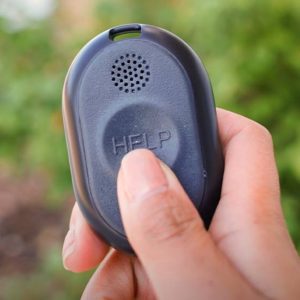
In September 2022, this GPS Mobile on-the-go product was updated to a new package called the SOS All-in-One. There are two main changes: The color of the device is fully black (no more black and white version), and Bay Alarm Medical has packaged an extra round help activation button with it. You can read more about the updated SOS All-in-One product here. There is also a new SOS Mobile product.
The SOS All-in-One uses is based on the same mobile GPS device we tested, so my experience and test results about this device, such as monitoring response time, will still apply.
Test call video (1 minute): Below, you can watch me push the help button and how it triggered a call to Bay Alarm Medical‘s monitoring center. This video gives you a close-up look at what happens from a user perspective.
Year-End Special Sale!: FREE Month and FREE Shipping on Select Plans + Up to 20% OFF Mobile Devices (From $49.50). Call 1-855-397-9964 or get started online.
Product Review with Hands-On Testing & Results
This Bay Alarm Medical on-the-go GPS device review is based on my first-hand experience testing and using the device. Here, I put Bay Alarm Medical’s official specifications and sales information to the test, and share the results with you. I’ll also include more nuanced feedback beyond merely relisting the features eg. what the button push process was actually like.
I appreciate you stopping by today. My wish is that readers like yourself can benefit somehow from my experience working with different medical alert systems (videos of my work).
| Feature | Test Results/ Supporting Evidence | Specifications |
|---|---|---|
| Response Time | Tested. 48 seconds average response time after button was pushed. Video record | No official specification |
| Speaker | Tested. Audio was loud and clear. Video record | No official specification |
| Locations Tracking | Tested. Locations tracking accurate in 10 test instances. Report | GPS and possibly wifi |
| Water-Resistance | Tested. Device worked as usual after a 1 minute dip in water. Photo record | Can be used in showers |
| Battery Life | Tested. Device lasted 2 to 3 days after a full charge. Test results | Up to 72 hours on standby |
| Cellular Connectivity | Tested. Test calls connected in my local area. Video record | AT&T Wireless 4G LTE |
| Automatic Fall Detection | Tested. Activated fall alert and test call went through automatically. Video record | Available as add-on option. Will not detect 100% of falls. |
Year-End Special Sale!: FREE Month and FREE Shipping on Select Plans + Up to 20% OFF Mobile Devices (From $49.50). Call 1-855-397-9964 or get started online.
Pros and Cons
Pros
- Attractive style and weight
- Good response time and connectivity
- Works through nationwide 4G LTE network (cellular service included)
- Clear speaker
- Accurate GPS location tracking
- Free Companion Caregiver app & Text and Email alerts
- Includes smaller help activation button (with new SOS All-in-One package)
- Add in-home base unit from $10/month (bundled deal)
Cons
- Device cost ($99, no extra activation fees)
- Not as petite as newer mobile options.
- Magnets felt strong, pacemaker wearers need to be careful (details).
Unboxing the Bay Alarm GPS Mobile Medical Alert System
The box contents included the main help button and GPS device, necklace lanyard, pouch with belt-clip, and a charging cradle or dock. In addition, there were printed instructions on getting started with the device, and accessing the accompanying Caregiver app.
The white and black on-the-go GPS device uses the Anelto On-the-go Lite device . Bay Alarm Medical offers the device in two colors: a black and a white model and all-black model. The device I ordered and shown in this review is the black and white one (see color options).
Prior to receiving the physical package, I also received an online account login, links to download user guides, and detailed information regarding their service and terms. Bay Alarm Medical’s presentation and processes are professional and updated for the digital age.
Product Size, Weight, and Design
In terms of looks, the Bay Alarm Medical GPS device is professional and classy. Although the device has been around for some time, its design and weight work well for 2022.
This GPS mobile medical alert device measures 2.87″ length by 1.85″ width by 0.73″ depth. According to official specifications, it’s 1.8 oz. My small weight scale measured it to be 1.9 oz. Either way, with or without that marginal 0.1 oz, it weighs less than it looks, which is very positive.
The Bay Alarm Medical on-the-go device’s sub-2.0 oz weight for a mobile medical alert is about average. What helps is that its package includes both a necklace lanyard and belt pouch for carrying the device. It’s thoughtful for Bay Alarm Medical to provide both alternatives. That way, we don’t have to rely on wearing it with a lanyard only, which can be tiring on our necks.
In my opinion, this product would be easier to wear if it was 10% to 20% smaller and lighter. Newer mobile GPS buttons from Medical Guardian and LifeFone are more than 30% lighter and smaller.
The Bay Alarm Medical mobile device has a water-resistance rating of IPX7, which means it is safe for use in showers. This is important as a lot of elderly falls at home occur in the bathroom, and these falls are more likely to lead to injuries.
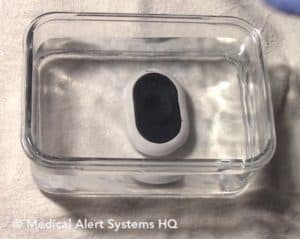
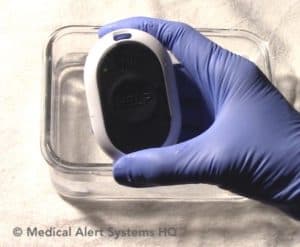
Strong Magnets – Pacemaker and Implanted Electronic Device Wearers Please Take Note
For pacemaker and implanted electronic devices wearers, this Bay Alarm Medical device contains some strong magnets. Not just within the main portable device, but the charging dock also. I noticed that their magnetic pull is stronger than what I’ve experienced with similar GPS devices.
Regardless, documentation for similar mobile devices would usually include precautions for wearers of implanted electronic devices (eg. pacemakers, defibrillators). For example, “Individuals with pacemakers should consult their physician and review their pacemaker materials regarding interaction with cell phones, and take the same precautions the materials recommend for this mobile device.”
According to the Bay Alarm Medical website, their mobile device “is recommended to be worn in the belt pouch that is provided to keep a safe distance away from a pacemaker.” For more assistance, please contact Bay Alarm Medical at toll-free 1-855-397-9964.
Call Response Time
The Bay Alarm Medical device has a large help button in the middle. To activate a call, I had to push on the Help button and hold it down for one to two seconds, past the initial button click.
When both the green light and audio beep came on, I was free to let go of the button. Those were signals to me that an emergency alert had been activated. The device followed up by announcing, “Placing an emergency call now.”
In the quick video below, you can see the process demonstrated through a test call I made. From my perspective, the audio beeps sounded clear. The beeps also repeated frequently, which is good because they reassured me about the call’s progress. If you have a minute, check out the video and get a sense of what the experience may feel like.
For the test call above, the response time is 29 seconds from the time of a button press to an operator answering the call. That call is on the faster end of the range of results we obtained for this product.
Overall, the Bay Alarm Medical on-the-go GPS response times ranged from 29 seconds to 73 seconds and averaged 48 seconds.
Bay Alarm Medical’s on-the-go product (Anelto ANH1117-01) performed about average for the response time metric, in line with the industry average range of between 30 to 60 seconds. There are other mobile devices that provided faster results, such as the Mini Guardian and LifeFone VIPx.
Year-End Special Sale!: FREE Month and FREE Shipping on Select Plans + Up to 20% OFF Mobile Devices (From $49.50). Call 1-855-397-9964 or get started online.
Connectivity
The connectivity for my test device was facilitated through AT&T’s Wireless 4G LTE network. My device was able to connect to a monitoring operator each time I tested it in my local area. Connectivity is dependent on the strength of local network signals and how the device performs in your local environment.
As such, once you get started, be sure to test your mobile device out for yourself. My monthly monitoring fees to Bay Alarm Medical covered the cellular service connection. No cell phone subscription was needed.
Battery Life Performance
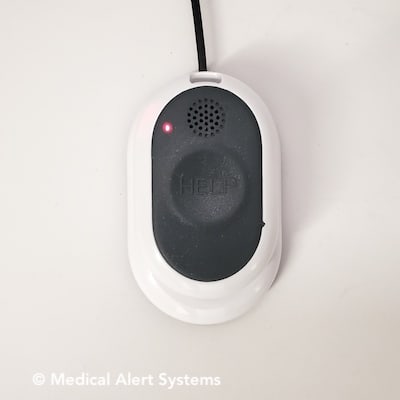
According to Bay Alarm Medical’s specifications, each full charge lasts for up to 72 hours (3 days). When I tested it, the duration tested true to what’s specified. In my experience, the battery level usually gets drained after 2 1/2 to 3 days. After that, it took me between 2 hours to 2 hours 20 min each time to recharge the device from a fully drained state to a 100% fully charged state.
Before the battery level drained out completely, the device provided me with numerous loud audio “low battery” warnings. The device would loudly announce, “Your device battery is low. For your protection, please place your device on the charger now.” While I found the announcements a good safety feature, I didn’t like being disrupted by their loudness every few days. Still, there is a good way to avoid the low battery audio alerts, which I cover next.
Daily Recharge
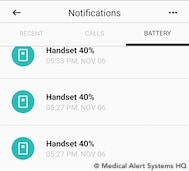
If I were to use the Bay Alarm Medical GPS unit as my main medical alert device, I would recharge it daily. That way, I will be assured that my device always stays charged. Plus, it will prevent the low battery level announcements from being frequently triggered. It’s also a practical routine as I can settle into doing a quicker partial recharge each day, depending on how much time I have.
If you can establish a consistent routine of daily recharging, the Bay Alarm Medical device could work smoothly. If you prefer something that does not demand as frequent recharging, the LifeFone VIPx or Medical Guardian Mini performed better in our testing.
Caregiver Participation
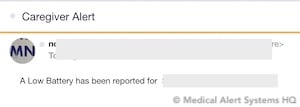
Bay Alarm Medical’s system also provides plenty of email and text warnings for caregivers. That allows the senior’s adult children or caregivers to keep abreast and help to make sure the device is charged and working. I find that emails and text messages are good additional avenues to reach me. Sometimes, smartphone notifications get crowded out and I miss them.
There is no extra charge for this service. As a comparison, Medical Guardian charges extra to add on email and text alerts.
GPS Location Tracking
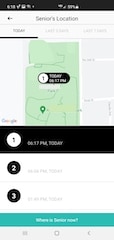
As a GPS device, the Bay Alarm Medical on-the-go GPS device pushes out GPS location updates continually in the background. Caregivers can also ping the device (ie. submit an inquiry) through the Caregiver app to get an updated location reading.
In terms of test results, the locations provided by my Bay Alarm Medical on-the-go device were accurate in more than 10 different locations. The location updates were delivered quickly too, typically within 20 seconds after submitting a query.
Throughout the day, a series of frequently updated device locations were displayed through the accompanying Caregiver App. This feature turns the Bay Alarm mobile device into a location tracker. The device’s location results can help to alleviate the anxiety that comes up when we can’t find our loved ones at the usual places.
Frequent Updates
By now, the availability of location tracking has become commonplace with similar top-tier mobile medical alert devices. Where the Bay Alarm Medical system does a little better in comparison with the rest is this: it pushes out more frequent location updates in the background.
The Caregiver App will show a list of recent location results even in the absence of a formal query submitted. The provides a breadcrumb trail of locations just in case.
However, these constant updates will also drain the device battery out more quickly. The resulting 2 to 3 days (or up to 72 hours) of battery life is passable but can be outperformed by premium competing products.
Fall detection
As part of this review, I turned on the fall detection feature on my Bay Alarm Medical on-the-go GPS device to test it out. The mobile device’s fall detection technology is based on multi-axis accelerometer sensors and internal algorithms to detect if a fall has happened. If so, the device will automatically activate an alarm call to the monitoring center.
Here is a 20-second video recording where I test out the fall alarm activation feature. I was able to activate a fall alert by dropping the device from a chest-high level. You can hear the device announcing, “A fall has been detected, dialing the emergency response center now.”
Year-End Special Sale!: FREE Month and FREE Shipping on Select Plans + Up to 20% OFF Mobile Devices (From $49.50). Call 1-855-397-9964 or get started online.
In the above test, the fall alert emergency call was answered by a live operator 35 seconds after the device hit the ground. That’s a fast response.
No Fall Alert Can Detect 100% of Falls
No fall detection mechanism will detect 100% of falls. It extends an extra layer of protection, but there will be times when it doesn’t work when needed. Any product user should adjust their expectations accordingly, and be prepared to still push on the help button during an emergency if they are able to.
False Alarms
On the other hand, there will be times when the fall alarm goes off when it wrongly senses a fall. In my experience, the Bay Alarm Medical’s GPS device generated a higher number of false alarms than similar mobile medical alert pendants I’ve tested. Even accidental drops from one to two inches resulted in an alert call being placed.
While this higher-than-average sensitivity ensures that a lot of possible falls are detected, it could also create extra inconvenience. What could help is to provide a way to cancel a false positive fall alarm that gets triggered. This fall alert cancellation feature is available on similar products like the Mini Guardian or LifeFone VIPx.
Contracts and Cancellations
One of the best things about Bay Alarm Medical is that its transaction processes are updated and clear. Some of the main problems working with medical alert companies have nothing to do with their products to services. They have to do with the sales pressure, cancellations, and refunds.
Through my interactions with Bay Alarm Medical, I found their staff and processes straightforward and reasonable. The company does not have a minimum term requirement, and they will provide pro-rated refunds for months prepaid and unused.
Their monthly cost of $29.95 is reasonable. For $99 plus tax, they sent me a new device that was mine to keep. I understand that they’ve since dropped the price to $79.
In addition, I had the option to add an in-home medical alert base unit for $10 a month. An in-home system is a good option for background in-home coverage anytime. You can use it when charging the mobile device and when you would rather not have to carry the mobile device around the home.
An in-home base system does not need any recharging, and its standard help button is much lighter to wear (about 0.5 to 0.7 oz).
Comparable Products to Consider
Medical Guardian Mini Guardian
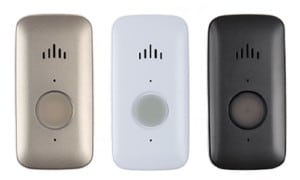
Medical Guardian is a top-rated company that is often compared to Bay Alarm Medical. One popular product to compare the Bay Alarm Medical GPS on-the-go device with is the Mini Guardian.
Like the Bay Alarm Medical GPS on-the-go device, the Mini Guardian is a small, all-in-one device that contains a speaker and microphone.
Performance
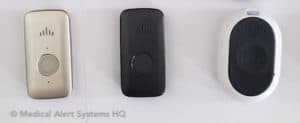
Compared to the Bay Alarm Medical GPS on-the-go device, the Mini Guardian tested better on these important performance metrics:
- Call response time (average 20 sec for Mini compared to 48 sec for Bay Alarm)
- Battery life (Up to 5 days for Mini compared to up to 2 to 3 days for Bay Alarm)
- Weight (1.3 oz for Mini compared to 1.8 oz for Bay Alarm)
The Bay Alarm Medical GPS tested better here:
Locations tracking. When I tested the Mini Guardian, the MyGuardian app was unable to provide updated location information at will. This may have changed. In contrast, Bay Alarm Medical’s caregiver app was able to provide accurate updated locations when queried.
Pricing. Medical Guardian charges more for its device and monthly fees. (Call Medical Guardian 1-800-311-6142 and ask for their best price.)
Hands-On Comparison
In terms of hands-on user experience, I found the Mini Guardian help button push and release comparatively easier. I could intuitively complete a push that activates an alarm. With the Bay Alarm Medical device, I had to more consciously hold the help button down. It takes about 1 to 2 seconds to complete a push until the device sounds a loud beep and voice announcement.
This was my experience and your approach could be different. Whichever device you go with, please test it out and ensure that you can comfortably use it.
Recommendations
Based on my test results and experience, I would recommend the Mini Guardian over the Bay Alarm Medical GPS on-the-go device if you seek a premium experience. The Mini Guardian is lighter, provided a quicker response time, and has longer battery life. I also found the Mini Guardian easier to use and wipe clean.
I would recommend the Bay Alarm Medical GPS on-the-go device for a younger or more tech-savvy senior who needs a basic on-the-go device that works well. In that case, the Bay Alarm Medical GPS device offers tremendous value and options.
LifeFone VIPx
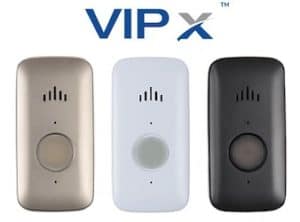
Besides the Mini Guardian, you may also like to know about the LifeFone VIPx. It uses the same hardware device as the Mini. Only in this case, the monitoring and subscription is offered through LifeFone.
LifeFone is a long-standing medical alert company with many years of experience. While their brand has not been extensively promoted, they also have high customer ratings and reviews (see website).

I am bringing the LifeFone VIPx up because I was able to successfully test and verify that its location retrieval feature works. If you like the Mini Guardian’s small profile, the LifeFone VIPx has that as well.
Recommendation
Similar to my recommendations above, I recommend the LifeFone VIPx over the Bay Alarm Medical GPS on-the-go device if you prefer a premium experience. These are my reasons:
Compared to the Bay Alarm GPS device, the LifeFone VIPx tested better in several decision-making areas. Its battery life lasted longer (5 to 16 days vs. 2 to 3 days for Bay Alarm), and its average response time was faster (32 sec vs. 48 sec for Bay Alarm). In addition, the device has a smaller and lighter profile, making it easier to wear throughout the day.
Summary
All in all, Bay Alarm Medical’s GPS mobile alert system is a good option for younger or tech-savvy seniors looking for a basic medical alert that works both at home and outside. The system consists of a main help button device and one-click access to 24/7 certified monitoring.
In addition, it comes with a full suite of free support tools for the subscriber and relatives (or caregivers). These include its companion caregiver app with location updates, an online dashboard with system status details, and email and text alerts. All these support system users in maintaining their independent lifestyles while providing peace of mind to family members.
For more information, please call Bay Alarm Medical at toll-free 1-855-397-9964 or sign-up for a free quote here.
Year-End Special Sale!: FREE Month and FREE Shipping on Select Plans + Up to 20% OFF Mobile Devices (From $49.50). Call 1-855-397-9964 or get started online.
Disclaimer: Our reviews are based on our actual experiences and research. This information is shared as is, without any warranties. We advise all readers to do careful due diligence before purchasing. Take time to speak with the company’s representatives or visit their official websites.
Submit my Bay Alarm Medical experience
Thank you for being our reader. Your opinion matters.
- Bay Alarm Medical In-Home Cellular Response Speed 46% Faster in 2023 - July 5, 2023
- Medical Alert Systems For Landlines - November 20, 2022
- The Truth About Long-Range Medical Alert Systems - May 1, 2022
In a hurry? Leave us your email, we’ll follow-up with the best tips.

